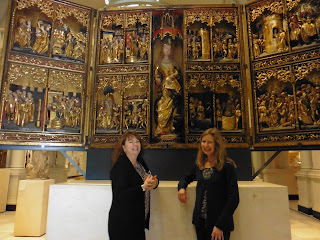The rose-petal tonic that Héloïse, my heroine of Blood Rose Angel (novel about the 14th century Black Plague in France) concocts to try and stop the plague spread is based on that of Michel de Nostradame, two centuries after the first outbreak.
Better known by his pseudonym, Nostradamus was one of the most fascinating personalities of 16th century France.
 On completion of his medical studies at the University of Montpellier, Nostradamus took to the countryside with his medical and astrological books and assisted in the care of Bubonic Plague victims. He prescribed fresh, unpolluted air and water and clean bedding, removal of the corpses and orders to clean the streets. Each morning before sunrise, he oversaw the harvest of rose petals which he then dried and crushed into fine powder, and made his “rose pills”. Patients were advised to keep under their tongues at all times without swallowing them.
On completion of his medical studies at the University of Montpellier, Nostradamus took to the countryside with his medical and astrological books and assisted in the care of Bubonic Plague victims. He prescribed fresh, unpolluted air and water and clean bedding, removal of the corpses and orders to clean the streets. Each morning before sunrise, he oversaw the harvest of rose petals which he then dried and crushed into fine powder, and made his “rose pills”. Patients were advised to keep under their tongues at all times without swallowing them.Nostradamus believed the plague was spread by contaminated air and that clean air protected people, but perhaps his success lay in the fact that fleas, which transmit the disease from rats to humans, were repelled by the rose pills’ strong smell, so at least the healthy didn’t catch it.
Whatever the reasons, Nostradamus was reputed to have saved thousands from plague in Narbonne, Carcassonne, Toulouse and Bordeaux.
 Nostradamus' Rose-pill Recipe... (good luck finding all these ingredients in your local store, ha!)
Nostradamus' Rose-pill Recipe... (good luck finding all these ingredients in your local store, ha!) Take one ounce of the sawdust or shavings of cypress-wood, as green as you can find, six ounces of Florentine violet-root, three ounces of cloves, three drams of sweet calamus, and six drams of aloes-wood.
Reduce the whole to powder before it spoils.
Next, take three or four hundred in-folded red roses, fresh and perfectly clean, and gathered before dewfall.
Pound them vigorously in a marble mortar with a wooden pestle.
When you are half through pounding them, add to them the above mentioned powder and immediately pound it all vigorously, while sprinkling on it a little rose-juice.
When everything is well mixed together, form it into little flat lozenges, as you would pills, and let them dry in the shade, for they will smell good…
And in order to make the mixture even more excellent, add as much musk and ambergris as you either can or wish.
If these two are added I do not doubt that you will produce a superbly pleasant perfume.
Pulverise the said musk and ambergris, dissolving it with rose-juice, then mix it in and dry in the shade.
Quite apart from the goodness and scent that this mixture lends to the items and mixtures mentioned above, you only have to keep it in the mouth a little to make your breath smell wonderful all day…
EXTRACT from Blood Rose Angel (third in The Bone Angel Trilogy: 3 standalone stories exploring different generations of a French village family against backdrops of the 1348 Black Plague, the French Revolution and WW2 Nazi-occupied France).
 'The pestilence has taken many others
in the ten days you’ve been gone. Everyone is afraid it’ll get as bad as in the
south. They say that in Bordeaux, bodies
are piling in the streets, and in Avignon four
hundred are dying daily, the graveyards so full they’re throwing corpses
into the Rhône River. At the monastery, all the monks are dead.’ She let
out a crazy kind of cackle. ‘Perhaps this truly is the end of the world.’
'The pestilence has taken many others
in the ten days you’ve been gone. Everyone is afraid it’ll get as bad as in the
south. They say that in Bordeaux, bodies
are piling in the streets, and in Avignon four
hundred are dying daily, the graveyards so full they’re throwing corpses
into the Rhône River. At the monastery, all the monks are dead.’ She let
out a crazy kind of cackle. ‘Perhaps this truly is the end of the world.’
‘The end of the
world … could that really be?’ I kept shaking my head at that impossible
thought. ‘No, Isa, after all this suffering, we can’t let it end here! I’ve had
idle time to think about what we spoke of before––treating the pestilence as a
garden weed––and I hope I’ve found a way to stop it spreading.’
‘Stop the
pestilence spreading? You must be mad, Héloïse. You know there’s no cure and––’
‘Not a cure …
listen to me. When I think about the people who’ve died in Lucie, none have
been silverhairs like you. Why is that, do you think?’
‘Because the old
ones, such as Poppa and me, must be good fighters of sickness; experienced
soldiers in the battle against disease. Or we’d already be in the ground.’
‘So I say we arm
the children and the young … give them weapons to fight off sickness,’ I said.
‘What if we mixed strength-building rose petals with other such plants into a fortifying
tonic?’ I took a quick breath. ‘We know that where there’s more filth and
vermin the pestilence flourishes, so we should also insist on frequent scrubbing
with the farmers’ sheep-washing soap. People should wash their hands in
rose-water, or vinegar, and we must tell them all to wear masks not only when
treating the sick but always while this pestilence rages.’
Blood Rose Angel print and e-book is available at the following retailers:














